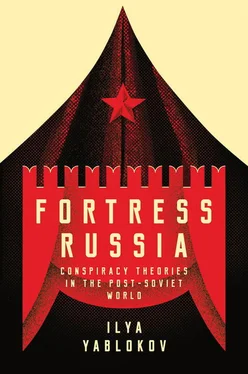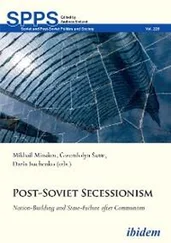However, Shevchenko’s anti-Israeli conspiracy mythmaking has a peculiar rhetorical twist aimed at the Russian domestic audience. He depicts the Russian-speaking community in Israel both as the most vitriolic in its attitudes towards the Palestinians, and the most mercantile. He contends that Jews left the Soviet Union when times were hard, and went to Israel in search of the good life. Settling in Israel, they criticized interethnic relations in Russia and made clear their hatred of the country’s Muslims, thus challenging the possibility of peace between nationalities in Russia (Shevchenko, 2012b). Shevchenko maintains that Russian Jews who oppose Putin are responsible for triggering interethnic conflicts between radical Islamists and Russian nationalists in the south of Russia. He also asserts that the Israelis will soon cause the disintegration of Russia and will build a new state on its territory to replace Israel in case the latter collapses (Goncharova and Shevchenko, 2012).
Shevchenko’s use of anti-Jewish conspiracy theories is an important development both in the nation’s discourse, and in its interethnic relations. Drawing on the extensive corpus of anti-Israeli and anti-Jewish writings, Shevchenko turns the Jews into the conspiring ‘Other’, determined to hinder the development of interethnic peace in Russia and to instigate conflicts in the North Caucasus. The connection between Israel and the USA allows Shevchenko to embed anti-Jewish discourse within the body of anti-Western conspiracy theories.
Shevchenko’s use of anti-Western and anti-Jewish narratives in a discourse about national cohesion is an interesting case of how conspiracy theories could be applied. By addressing his speeches to ethnic and religious minorities who are suffering from the growth in xenophobic attitudes on the part of the general Russian public, Shevchenko incorporates various minorities into the category of ‘the people’ who supposedly share a common ‘glorious past’ with the ethnic Russian majority. The promotion of conspiracy theories thus helps explain the growth in interethnic tension; they point to supposedly treasonable actions on the part of the opposition, corrupt authorities and external powers, while at the same time distancing the Kremlin from the conflicts. Shevchenko’s charisma and rhetorical skills, together with the support of the Kremlin, enable him to act as an efficient agent of conspiracy mythmaking and a contributor to the official political discourse.
This chapter has demonstrated the significant role performed by public intellectuals in spreading anti-Western conspiracy theories in Russia. The intellectuals’ efforts to develop their own conspiracy theories or borrow them from foreign sources has played an important part in strengthening anti-Western attitudes in the country. The fact that they focus so much on Russia’s geopolitical domination as a superpower in the past demonstrates how strongly they resent their country’s loss of international influence in the 1990s. The political elites’ inability to cope with the changing system of international relations after the Soviet collapse has, paradoxically, stimulated, rather than constrained, this ‘great power’ mentality (Lo, 2003, p. 74).
The popularity of anti-Western conspiracy theories explaining Russia’s loss of superpower status and the uncontested domination of the USA could be interpreted as a manifestation of the inequality in relations between Russia and the USA after 1991. Public intellectuals’ criticism of the West, as expressed through conspiracy theories, helps to present a more positive image of Russia. Despite socio-economic upheavals, public intellectuals have managed to portray the country as a great multi-ethnic state, which resists the West’s attempts to control the world and take over Russian territories and resources.
What distinguishes Russian from US conspiracy mythmaking is the engagement of public intellectuals in the politics of the ruling elites. The anti-elitism of conspiracy theorists in the USA indicates that they belong to ‘the people’ (Kay, 2011) and strengthens the populist aspect of their rhetoric. It is likely that US conspiracy theorists aspire to becoming part of the political elite and influencing the political agenda, but this is not how they represent themselves. Furthermore, in the USA, unlike in Russia, public consensus regarding the boundaries and rules of permissible types of political rhetoric significantly reduces the chances of conspiracy theorists gaining high social and academic standing. Even if they do, they generally do not remain in office for long.
Unlike their counterparts in the USA, some Russian authors of anti-Western conspiracy theories are ranked among the most influential public intellectuals; they publish books and have access to the mainstream media, particularly those controlled by the state. The articulation of even the most bizarre conspiratorial ideas does not lead to exclusion from mainstream politics. Indeed, as early as the late 1990s, the ruling elite of Russia understood that anti-Western conspiracy discourse could lead to the achievement of social cohesion. This has allowed top-ranking officials to put the work of conspiracy theorists to use for both domestic and international purposes.
Producers of knowledge – in this case, public intellectuals – have made their own attempts to gain power by becoming part of the political hierarchy. The Foucauldian concept of power/knowledge, as applied to conspiracy discourse in Russia, highlights the dependence of public intellectuals on the power institutions in the state. At the same time, the political elites are dependent on producers of such knowledge for their ability to provide intellectual support to the political regime.
Pavlovskii’s attempts to use public intellectuals to create a political discourse favourable to the Kremlin were successful; they took the form of a range of Kremlin-connected think tanks and foundations which praised Putin and criticized his opponents. The intellectuals affiliated with these organizations spread anti-Western conspiracy theories among ordinary Russians through the media, claiming to reveal the ‘genuine’ causes of domestic and international events. The Kremlin’s control of major information sources, particularly television, has offered loyal intellectuals a unique opportunity to articulate populist conspiratorial notions effectively. Accordingly, public intellectuals have become important producers of conspiratorial discourse, which has been aimed, to use Foucault’s theory, at establishing a particular regime of truth.
Each of the intellectuals discussed in this chapter has contributed to the promotion of a conspiratorial perception of the West by publishing books, hosting talk shows, and supplying highly ranked politicians with ideas which the intellectuals adopted from the West. The public careers of Dugin, Narochnitskaia and Shevchenko reveal that anti-Western conspiracy theories are among the most popular instruments of social cohesion used by the political elites to maintain control over the country. Opposition to the Kremlin is the usual target of the otherwise different populist discourses articulated by these intellectuals, each of which has the aim of constructing an ‘Other’ within the nation. None of the intellectuals openly acknowledges his or her affiliation with the authorities and at times even stresses that their activities are oppositional. Yet they all support Putin’s role as the single political leader of the country. In line with Pavlovskii’s political projects, the anti-Western conspiracy theories expounded by public intellectuals have become a populist tool; this serves to legitimize the authoritarian rule of the president and delegitimize his opponents.
Читать дальше
Конец ознакомительного отрывка
Купить книгу












